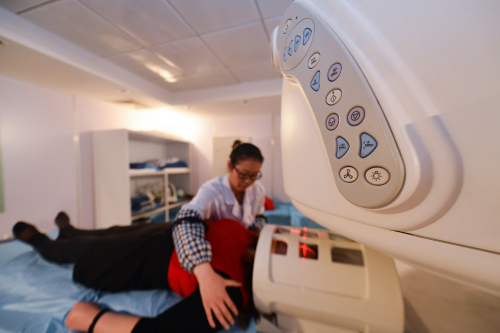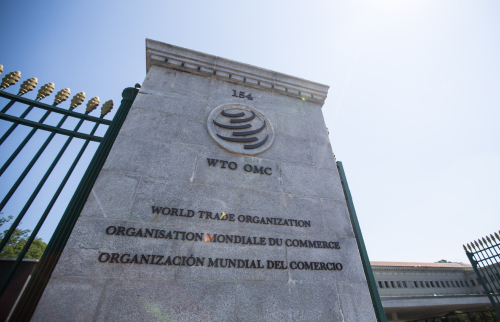|
 |
|
A patient is examined by a magnetic resonance imaging (MRI) machine in a hospital in Geermu, northwest China’s Qinghai Province. MRI machine is included in the WTO’s latest tariff elimination deal (XINHUA) |
The 54 WTO members representing major exporters of information technology (IT) products finalized a deal in Geneva on July 24 to eliminate tariffs on 201 such products, in an effort to boost global trade of goods ranging from video games to medical equipment.
The agreement came as an update of WTO's 18-year-old Information Technology Agreement (ITA). Among the products added to the list of goods covered by zero-tariff trade are new-generation semiconductors, GPS navigation systems, medical products which include magnetic resonance imaging (MRI) machines, machine tools for manufacturing printed circuits, telecommunications satellites and touchscreens, the WTO said in a press release.
Under the terms of the agreement, the majority of tariffs will be eliminated on these products within three years, with reductions beginning from July 1, 2016.
A landmark deal
The deal means consumers will have to pay less for products such as computers, touchscreen devices, game consoles and hi-fi systems, while companies will see cuts in the cost of machine tools and components, giving a boost to economies globally.
The first major tariff-cutting deal at the WTO in 18 years, the deal means an expansion of the 1997 Information Technology Agreement (ITA) that involves 80 members.
In 2012, WTO members recognized that technological innovation had advanced to such an extent that many new categories of IT products were not covered by the existing agreement. Negotiations began in 2012 to expand the coverage of the ITA.
Annual trade of the newly added 201 products is valued at over $1.3 trillion per year, accounting for roughly 7 percent of total global trade. This is larger than global trade in automotive products, or trade in textiles, clothing, iron and steel combined, WTO data showed.
According to estimation by American Chamber of Commerce, removing tariffs on trade worth $1.3 trillion is expected to give a $190 billion boost to the world economy.
WTO Director General Roberto Azevêdo hailed the ITA expansion as a landmark, saying it will create jobs, help boost GDP growth around the world and support lower prices across several sectors that use IT products.
"Eliminating tariffs on trade of this magnitude will have a huge impact. It will support lower prices--including in many other sectors that use IT products as inputs--it will create jobs and it will help to boost GDP growth around the world," he said in a statement.
The Director General added that no other negotiating forum could include so many countries. He pointed out that all 161 WTO members will benefit from this agreement, as they will all enjoy duty-free access in the markets of those members who are eliminating tariffs on these products.
He Weiwen, a researcher with the China WTO Research Institute, said the ITA expansion has re-affirmed the WTO's status in facilitating global trade.
"It shows what a multilateral trading system can deliver against the backdrop of an increasing amount of regional and bilateral trade talks. A multilateral trading system still takes the lead. The deal has far-reaching significance as it reshapes the global IT industrial chain," He said.
Chen Fengying, a senior researcher at the China Institutes of Contemporary International Relations, said the ITA expansion will help lift the global economy.
"Future industrial revolution is bound to be one combining the IT industry, represented by the Internet, and traditional industries. The IT industry is the only highlight in global trade, with a large trade volume and involving a large number of countries. Promoting IT trade is the most direct and most effective means in boosting global trade and economy," Chen elaborated.
 |
|
The outside of WTO headquarters in Geneva (XINHUA) |
Pros and cons
In terms of its impacts on China, He, the researcher with the China WTO Research Institute, said the advantage outweighs the disadvantage.
"Compared to developed countries, China's IT industry is in the mid- to low-end of the global industrial chain. The elimination of tariff on hi-tech components will make it easier and cheaper for Chinese companies to access state-of-the-art technologies in the world," He said. "Also, it will boost the exports of Chinese IT products that can compete in the global market."
"However, opening up is always a two-way street. It will deal a blow to those vulnerable parts of China's IT industry, which will push those market players to upgrade their technology and sharpen their spirit of competition," He said.
Wang Yijiang, a senior analyst with the IT industry, forecasted the game console industry will witness a boom in China after the tariffs are lifted.
"Previously, foreign companies had been prohibited from producing and selling game consoles in China. The ban was lifted in 2014 and Sony and Microsoft game consoles have entered the Chinese market. Once the tariffs are lifted, their products will gain a more firm foothold in China, leading the development of China's gaming industry," Wang said.
On the other side of the equation, analysts warned the deal is a double-edged sword that would hurt less competitive Chinese firms. "China is the biggest exporter and importer of information and communications technology products. However, China doesn't possess an edge in semiconductors, chips, processors and medical equipment. The expanded ITA will deal a blow to those industries in China," said Tu Xinquan, Deputy Director of the China Institute for WTO Studies at the Beijing-based University of International Business and Economics.
For domestic consumers, Liang Jia, an analyst with Citi Bank, said the tariff elimination is definitely a boon.
"After tariffs are removed from such IT products as MRI machines, GPS navigation systems and computer software, domestic consumers will have cheaper access to foreign products, maybe to the extent of an 8-20 percent price cut," Liang said.
However, the much-beloved smartphones and laptops are not included in the deal. "It means domestic consumers can't buy new iPhones at as low price as in the Hong Kong and U.S. markets," Liang said.
Copyedited by Kylee McIntyre
Comments to zhouxiaoyan@bjreview.com | 